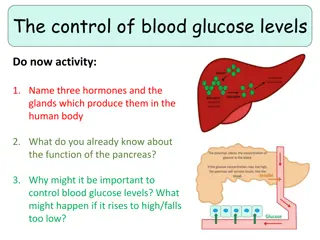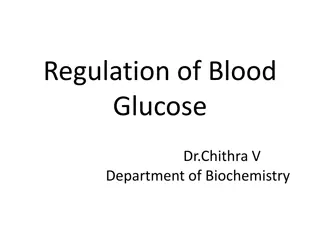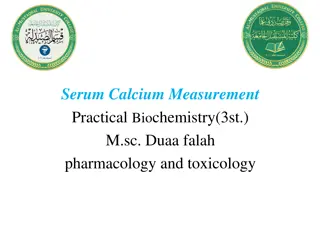Comprehensive Overview of Pancreas Function and Structure
Pancreas is a vital organ in the abdomen with dual exocrine and endocrine functions. As an exocrine organ, it secretes digestive enzymes and bicarbonates into the duodenum for food breakdown. In its endocrine role, the pancreas regulates blood sugar levels by secreting insulin, glucagon, somatostati
1 views • 16 slides
Understanding Blood Glucose Control Mechanisms in the Human Body
This content explores the regulation of blood glucose levels in the human body, covering the role of hormones like insulin and glucagon produced by the pancreas. It discusses the importance of maintaining proper blood glucose levels and the consequences of levels being too high or too low. The text
0 views • 19 slides
Regulation of Blood Glucose and Its Importance in Maintaining Health
Blood glucose regulation is crucial for energy supply in the body, particularly for brain function. Understanding the balance of glucose entering and leaving the blood through processes like absorption, glycogenolysis, and gluconeogenesis is vital. Hormones like insulin and glucagon play key roles i
0 views • 10 slides
Understanding Serum Calcium Measurement in Practical Biochemistry
Calcium is a crucial mineral for various bodily functions like muscle and nerve signaling, heart health, and bone formation. Serum calcium tests help screen for bone diseases and calcium disorders by measuring the amount of calcium in the blood. Two types of tests, total calcium and ionized calcium,
0 views • 12 slides
Exploring the Intricacies of Mitosis, Neurons, and Endocrine System
Delve into the world of biology and neuroscience with detailed images depicting mitosis, chromatids, equator, spindle fibres, diploid and haploid cells. Explore the journey from stem cells to tissues and organs, including the Central Nervous System (CNS) components like cerebellum, cerebrum, and med
0 views • 72 slides
Symptomatic Control of Functioning Pancreatic NET
Pancreatic neuroendocrine tumors (panNETs) can be classified as functioning or non-functioning, with functioning tumors producing active hormones such as insulin, glucagon, gastrin, or VIP. Symptomatic control is crucial for managing these tumors, with diagnoses based on clinical syndromes and hormo
0 views • 19 slides





